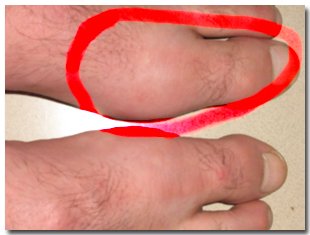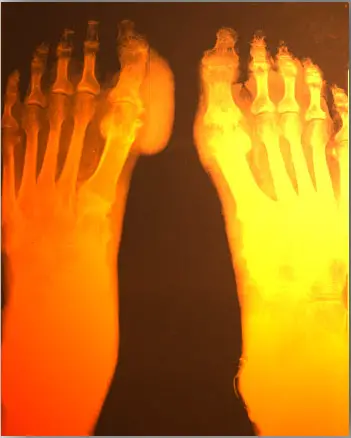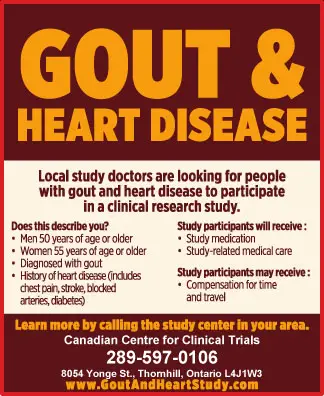Current Gout Clinical Trials
Current Gout clinical Trials

We will try and update you with the current gOUT CLINICAL TRIALS
Generally these are available for participation for a short time then disappear quickly. Anyway we will do our best to keep this updated.
Gout (Hyperuricemia) Clinical Trials
gout clinical Trials Click here for USA
Current Gout Clinical Trials
Tolerization Reduces Intolerance to Pegloticase and Prolongs the Urate Lowering Effect
Status: Enrolling,
Phase
II
Updated: 3/18/2016
Rheumatology Associates Of North Alabama, P.C.
Gout Clinical Trials
Safety and Pharmacodynamics of SEL-212 (Pegsiticase + SEL-110) in Subjects With Elevated Blood Uric Acid Levels
Status: Enrolling,
Phase
I
Updated: 1/6/2016
Gout Clinical Trials
Tolerization Reduces Intolerance to Pegloticase and Prolongs the Urate Lowering Effect
Status: Enrolling,
Phase
II
Updated: 3/18/2016
Revive Therapeutics Announces Initiation of a Phase 2A Study of REV-002 (Bucillamine) in Patients With Gout
Current Gout Clinical trials
- Alabama
- Alaska
- Arizona
- Arkansas
- California
- Colorado
- Connecticut
- Delaware
- Washington DC
- Florida
- Georgia
- Hawaii
- Idaho
- Illinois
- Indiana
- Iowa
- Kansas
- Kentucky
- Louisiana
- Maine
- Maryland
- Massachusetts
- Michigan
- Minnesota
- Mississippi
- Missouri
- Montana
- Nebraska
- Nevada
- New Hampshire
- New Jersey
- New Mexico
- New York
- North Carolina
- North Dakota
- Ohio
- Oklahoma
- Oregon
- Pennsylvania
- Rhode Island
- South Carolina
- South Dakota
- Tennessee
- Texas
- Utah
- Vermont
- Virginia
- Washington
- West Virginia
- Wisconsin
- Wyoming
this site has the world listings of current gout clinical trials
just pick your country
Canada - Below advertisement - Current Gout clinical trials
Gout: Allopurinol vs. Febuxostat Trials
Current gout Clinical Trials - Arthritis - Australia
Current Gout Clinical Trials Cincinnati, oh
Current Gout clinical trials Arizona
Current Gout clinical trials Victoria - Texas
Current Gout Clinical Trials - Columbus, Ohio
Current Gout Clinical trials - Albuquerque
By Nick Waddell
TORONTO, ONTARIO– (Jan. 29, 2015) – Revive Therapeutics Ltd. (“Revive” or the “Company”) (TSX VENTURE:RVV) is pleased to announce the initiation of a Phase II-A clinical study in patients with gout in the U.S. The initiation of the Phase II-A study for gout follows Revive’s recent announcement that the U.S. Food and Drug Administration (“FDA”) has accepted the Company’s Investigational New Drug Application (“IND”) to commence a clinical trial for REV-002 (Bucillamine) for the treatment of gout.
The Phase II-A study is an open-label, multicenter, active-controlled, parallel-group clinical trial designed to evaluate the safety and efficacy of two doses of Bucillamine compared with low-dose Colchicine in the treatment of patients with acute gout flare. The study will be performed in a total of sixty-six eligible patients, who are confirmed with qualifying gout flare, and who will be randomized in a 1:1:1 allocation ratio to either Bucillamine low dose, Bucillamine high dose or Colchicine treatments over a seven day treatment period. The primary efficacy endpoint will be the proportion of patients who responded to treatment. Treatment responders are defined as a ≥ 50% reduction in target joint pain score from baseline at 72 hours post dose without using rescue drug. The secondary efficacy endpoint will be the proportion of patients with ≥ 50% reduction in target joint pain score from baseline at 24 hours and 48 hours post dose without using rescue drug. Exploratory endpoints will also include measurement parameters in uric acid, C-reactive protein, Interleukin-1beta, and Interlleukin-6.
Although gout is a treatable condition, there are limited treatment options, many of which have adverse side effects. Drug treatment for gout includes anti-inflammatory agents (non-steroidal anti-inflammatories (NSAIDs), corticosteroids, colchicine) and serum urate-lowering therapies, which work by lowering body stores of uric acid. Treatment of gouty inflammation is complicated by the fact that gout patients have a high incidence of cardiovascular and metabolic comorbidities. Common comorbidities include hypertension (70-80%), coronary artery disease (>30-40%), chronic kidney disease (~30-50%), diabetes (~25-40%), gastrointestinal tract diseases, and congestive heart failure (Source: Keenan, RT et. al., Prevalence of contraindications and prescription of pharmacologic therapies for gout. Am. J. Med. 2011, 124: 155-163). Managing patients with these comorbidities is challenging because many of them are contraindicated for medications currently available to treat gout. For example, corticosteroids can cause hypertension and worsening of blood sugar, and NSAIDs have substantial renal and cardiovascular toxicity. A majority of gout patients harbor moderate to strong contraindications to multiple first-line gout treatment medications.
“I am very pleased to see Revive enter its next chapter in the clinical development program for gout with the FDA acceptance of its IND and the initiation of the Phase II-A study in the U.S.” said Dr. Robert Terkeltaub, MD, Clinical Advisor for Revive. “There remains significant unmet need for novel therapies targeted towards preventing and/or treating gouty inflammation and lowering serum uric acid levels. The majority of gout patients have comorbidities that increase adverse events and potential drug interactions of the current generation of therapeutics for gout. Hence agents that can successfully control gout, without inducing more drug-related gout flares and adverse events, will be particularly welcome options in managing patients with gout. Revive’s drug candidate, REV-002, merits investigation for clinical care and outcomes in gout patients.”
“The initiation of the Phase II-A study marks another important milestone for Revive,” says Fabio Chianelli, Chief Executive Officer of Revive. “I am very excited to advance our gout treatment into human clinical trials in the U.S. and I look forward to updating the investment and medical communities on our developments as they arise.”
About Gout
There were 14.3 million diagnosed prevalent cases of chronic gout in the major pharmaceutical markets in 2012, which is forecast to increase to 17.7 million by 2021 (Source: Decision Resources 2012). The prevalence of gout in the U.S. affects approximately 8.3 million (~3.9%) of American adults (Source: Arthritis Rheum. 2011 Oct; 63(10):3136-41). It is estimated that the gout disease treatment market value will increase from $989 million in 2013 to $2.28 billion by 2018 (Source:GlobalData 2014). Gout is a painful disorder caused by elevated serum uric acid (sUA) in the body due to under excretion of uric acid and/or over production of uric acid. Most patients on the most commonly employed regimens for uric acid lowering fail to achieve a satisfactory serum urate level. Poor control of gout can lead to acute attacks of severe pain, and chronic joint damage and impairment of health related quality of life. Accordingly, there are needs in the market for new therapies to control gouty inflammation and hyperuricemia.
About REV-002
REV-002 (Bucillamine) is being repurposed by Revive as a potential new treatment for gout. Bucillamine is a disease-modifying anti-rheumatic drug, which is prescribed for rheumatoid arthritis in Japan and South Korea. In animal studies for gout, it has been shown that REV-002 limits inflammation alone and in combination with colchicine, and at higher doses it lowers uric acid especially in combination with allopurinol. REV-002 will be evaluated in a Phase II-A clinical study in patients with gout in the U.S.
About Revive Therapeutics Ltd.
Revive Therapeutics Ltd. (TSX VENTURE:RVV) is focused on acquiring, developing and commercializing treatments for major market opportunities such as gout, Rett syndrome, a rare disease, and post-operative pain. Revive aims to bring drugs to market by finding new uses for old drugs, also known as drug repurposing, and improving the therapeutic performance of existing drugs for underserved medical needs. Additional information on Revive is available atwww.revivethera.com.
CAUTIONARY NOTE REGARDING FORWARD-LOOKING STATEMENTS
This news release includes certain information and statements about
management’s view of future events, expectations, plans and prospects
that constitute “forward looking statements”, which are not comprised of
historical facts. Forward-looking statements may be identified by such
terms as “believes”, “anticipates”, “intends”, “expects”, “estimates”,
“may”, “could”, “would”, “will”, or “plan”, and similar expressions.
Specifically, forward looking statements in this news release include,
without limitation, statements regarding: the closing of the Offering
and the use of proceeds therefrom; the Company’s drug research and
development plans; the timing of operations; and estimates of market
conditions. These statements involve known and unknown risks,
uncertainties, and other factors that may cause actual results or
events, performance, or achievements of Revive to differ materially from
those anticipated or implied in such forward-looking statements. The
Company believes that the expectations reflected in these
forward-looking statements are reasonable, but there can be no assurance
that actual results will meet management’s expectations.
In formulating the forward-looking statements contained herein,
management has assumed that business and economic conditions affecting
Revive will continue substantially in the ordinary course and will be
favourable to Revive, that Revive will be able to obtain all requisite
regulatory approvals to commercialize its drug candidates, that such
approvals will be received on a timely basis, and that Revive will be
able to find suitable partners for development and commercialization of
its drug repurposing candidates on favourable terms. Although these
assumptions were considered reasonable by management at the time of
preparation, they may prove to be incorrect. Factors that may cause
actual results to differ materially from those anticipated by these
forward looking statements include: uncertainties associated with
obtaining regulatory approval to perform clinical trials and market
products; the need to establish additional corporate collaborations,
distribution or licensing arrangements; the Company’s ability to raise
additional capital if and when necessary; intellectual property
disputes; increased competition from pharmaceutical and biotechnology
companies; changes in equity markets, inflation, and changes in exchange
rates; and other factors as described in detail in Revive’s Annual
Information Form for the period ended June 30, 2014 and Revive’s other
public filings, all of which may be viewed on SEDAR (www.sedar.com).
Given these risks and uncertainties, readers are cautioned not to place
undue reliance on such forward looking statements and information, which
are qualified in their entirety by this cautionary statement. Except as
required by law, Revive disclaims any intention and assumes no
obligation to update or revise any forward looking statements to reflect
actual results, whether as a result of new information, future events,
changes in assumptions, changes in factors affecting such forward
looking statements or otherwise.
Neither the TSX-V nor its Regulation Services Provider (as that term is defined in the policies of the TSX-V) accepts responsibility for the adequacy or accuracy of this release.
Contact Information
Revive Therapeutics Ltd.
Fabio Chianelli
Chief Executive Officer
(905) 605-5535 (ext. 10)
[email protected]
www.revivethera.com
The list below is the most current Gout clinical trials in the U.S.A, there are a few in the UK also. There are quite a few that may be closed pending when you look at this list. This will be updated regularly. RED is completed. Green is recruiting, and Yellow is Enrolling by invitation
Recruiting
Evaluating the Effectiveness of a Chronic Disease Management Program for Gout
Condition:
Recurrent or Tophacous Gout
Interventions:
Other: Control; Other: Gout Disease Management Program
Completed
Has Results
Evaluating Efficacy of Canakinumab (ACZ885) in Prevention of Acute Flares in Chronic Gout Patients Initiating Allopurinol Therapy
Condition:
Gout
Interventions:
Drug: Canakinumab 25 mg; Drug: Canakinumab 50 mg; Drug: Canakinumab 100 mg; Drug: Canakinumab 200 mg; Drug: Canakinumab 300 mg; Drug: Canakinumab repeated every 4 week (q4wk); Drug: Colchicine; Drug: Allopurinol; Drug: Placebo Matching Canakinumab; Drug: Placebo Matching Colchicine
Completed
Long Term Study of Canakinumab (ACZ885) in Patients With Gout
Condition:
Gout
Intervention:
Drug: Canakinumab
Completed
Has Results
Canakinumab in the Treatment of Acute Gout Flares and Prevention of New Flares in Patients Unable to Use Non-steroidal Anti-inflammatory Drugs (NSAIDs) and/or Colchicine Including a 12 Weeks Extension and an Open-label 48 Weeks Extension Study
Condition:
Acute Gout
Interventions:
Drug: Canakinumab 150 mg; Drug: Triamcinolone acetonide 40 mg; Drug: Placebo to canakinumab; Drug: Placebo to triamcinolone acetonide
Current Gout clinical trials
Completed
Has Results
Canakinumab in the Treatment of Acute Gout Flares and Prevention of New Flares in Patients Unable to Use Non-steroidal Anti-inflammatory Drugs (NSAIDs) and/or Colchicines Including a 12 Week Extension and a 1 Year
Open-label Extension Study.
Condition:
Acute Gout
Interventions:
Drug: Canakinumab 150 mg; Drug: Triamcinolone acetonide 40 mg; Drug: Placebo to canakinumab; Drug: Placebo to triamcinolone acetonide
Recruiting
A Proof-of-Concept Study Of AC-201 to Prevent Gout Flares
Condition:
Gout Flares
Interventions:
Drug: AC-201 50mg Capsule BID for 16 Weeks; Drug: Placebo Capsule BID for 16 Weeks
Completed
Assessment of Primary Care Providers' Knowledge and Beliefs Regarding Gout Management
Condition:
Gout
Intervention:
Recruiting
Safety & Efficacy of Canakinumab (ACZ885) in Patients With Frequent Flares for Whom Nonsterodial Anti-Inflammatory Drug (NSAIDs) and/ or Colchicine Are Contraindicated, Not Tolerated or Ineffective
Condition:
Gouty Arthritis
Interventions:
Biological: Canakinumab, ACZ885; Drug: Triamcinolone acetonide
Recruiting
Study of Levotofisopam 50 mg Three Times a Day (TID) Administered for 7 Days on Hyperuricemia and Gout
Conditions:
Hyperuricemia; Gout
Intervention:
Drug: levotofisopam
Current Gout clinical trials
Recruiting
The Influence of Antiphospholipid Antibodies on the Relationship Between Hyperurecemia, Gout and Metabolic Syndrome
Conditions:
Antiphospholipid Antibodies-associated Endothelial Impairment; Hyperurecemia; Gout; Metabolic Syndrome
Intervention:
Enrolling by invitation
An Assessment of Chronic Synovial-Based Inflammation and Its Role With Serum Urate Levels.
Condition:
Gout
Interventions:
Other: Magnetic Resonance Imaging; Other: Plain Radiographs; Drug: Febuxostat; Drug: Colchicine
Recruiting
Combining Lesinurad With Allopurinol in Inadequate Responders
Condition:
Gout
Interventions:
Drug: Lesinurad; Drug: Placebo
Enrolling by invitation
Lesinurad and Febuxostat Combination Extension Study in Gout
Condition:
Gout
Intervention:
Drug: lesinurad
Recruiting
Purine Metabolism Enzyme SNP to Uric Acid Production
Conditions:
Gout; Hyperuricemia
Intervention:
Recruiting
Observational Study of the Use of KRYSTEXXA® in Refractory Chronic Gout
Condition:
Chronic Gout
Intervention:
Biological: pegloticase
Current Gout clinical trials
Recruiting
Arthritis Research UK Gout Treatment Trial - Phase 2
Condition:
Gout
Interventions:
Other: Nurse intervention; Other: Standard care
Recruiting
Combination Treatment Study in Subjects With Tophaceous Gout With Lesinurad and Febuxostat
Condition:
Tophaceous Gout
Interventions:
Drug: Lesinurad; Drug: Placebo
Recruiting
Lesinurad Monotherapy in Gout Subjects Intolerant to Xanthine Oxidase Inhibitors
Condition:
Gout
Interventions:
Drug: lesinurad; Drug: Placebo
Recruiting
Combining Lesinurad With Allopurinol in Inadequate Responders
Condition:
Gout
Interventions:
Drug: Lesinurad; Drug: Placebo
Recruiting
An Open-label Extension Study With Canakinumab on the Treatment and Prevention of Gout Flares up to 3 Years
Condition:
Chronic Gouty Arthritis
Intervention:
Biological: canakinumab
Recruiting
Impact of Blueberries on Hyperuricemia and Gout
Conditions:
Hyperuricemia; Gout
Interventions:
Dietary Supplement: Blueberry Powder; Dietary Supplement: Placebo Powder
Enrolling by invitation
Open-Label Lesinurad Monotherapy Extension Study in Gout
Condition:
Gout
Intervention:
Drug: lesinurad
Enrolling by invitation
Lesinurad and Allopurinol Combination Extension Study in Gout
Condition:
Gout
Intervention:
Drug: Lesinurad
Recruiting
Study of Febuxostat Effect on Blood Pressure in Patients With High Normal Blood Pressure
Conditions:
Prehypertension; Gout; Pulse Wave Velocity; Hypertension; 24 Hour Blood Pressure
Intervention:
Drug: Febuxostat
Recruiting
Cardiovascular Safety of Febuxostat and Allopurinol in Patients With Gout and Cardiovascular Comorbidities
Condition:
Cardiovascular Disease
Interventions:
Drug: Febuxostat; Drug: Allopurinol
Recruiting
Effects of Hyperuricemia Reversal on Features of the Metabolic Syndrome
Condition:
Gout
Intervention:
Drug: Febuxostat
Recruiting
Long-Term Safety and Tolerability of Canakinumab Prefilled Syringes in Frequently Flaring Acute Gouty Arthritis Patients
Condition:
Acute Gouty Arthritis
Intervention:
Drug: Canakinumab 150mg in prefilled syringe
Recruiting
Hereditary Tubulointerstitial Nephritis
Conditions:
Nephritis, Interstitial; Chronic Renal Failure; Gout; Renal Cysts
Intervention:
Other: Blood and urine sample collections
Recruiting
Safety, Tolerability and Pharmacokinetic/Pharmacodynamic Characteristics of LC350189
Conditions:
Hyperuricemia; Gout
Intervention:
Drug: LC350189
Recruiting
Single and Multiple Dose Study in Japanese
Condition:
Gout
Interventions:
Drug: Lesinurad; Drug: Placebo
all of the above information plus hundreds of results of gout clinical trials are provided by http://clinicaltrials.gov
A service of the U.S. National Institutes of Health


Recent Articles
-
Tony
May 08, 24 08:57 PM
Hi Peter, I am a physician, had my first Gout episode last week. I was surfing through the web and happened to come across your site. I am impressed by -
What is it about Cherries?
Aug 25, 21 03:59 AM
Allopurinol worked for me, but at the expense of adversely affecting my mood.I like cherries, but getting them every day of the year is a problem.I wondered -
ACV made my gout worse...
Apr 22, 20 07:19 AM
During my first gout attack, I was in so much pain that I desperately scoured the internet for alternative cures as the colchicine that I was prescribed



